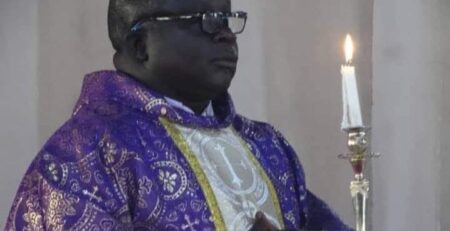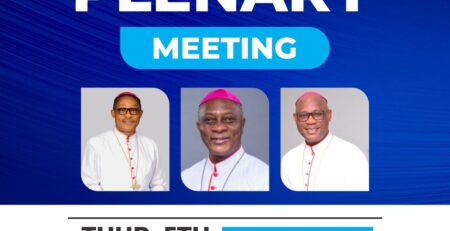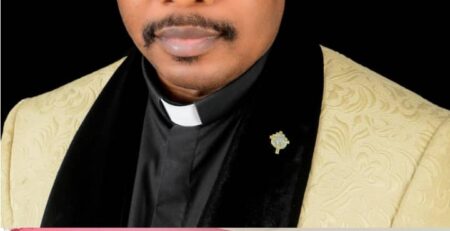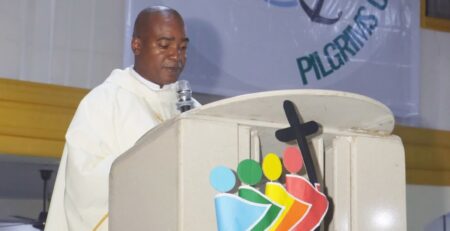Pope Francis: A Model of Mercy and Simplicity I Aspire to Embrace
By Fr. Michael ‘Leke Banjo
In a world that wraps power in ego and casts authority as something to be feared, Pope Francis was a striking contradiction: a shepherd who led from within his flock, never towering above them. As Supreme Pontiff of over 1.4 billion Catholics and Head of the Vatican City State, he held one of the most influential offices on earth. Yet his leadership was defined not by grandeur but by gospel simplicity, not by command alone but by the quiet eloquence of mercy.
From the moment he stepped onto the loggia of St. Peter’s Basilica on that cool March evening in 2013, he expressed the kind of pope he would be: one of humility, simplicity, and profound connection with the people. He bowed his head and asked the people to pray for him before he gave his blessing. It was a gesture of humility that echoed the example of the carpenter of Nazareth. And when multitudes began preparing to travel to Rome for his inaugural Mass, he urged them not to come. Instead, he invited them to use that money to care for the poor. With this gesture, Pope Francis took us along the path of charity, drawing attention to the peripheries where Christ suffers in the poor, the hungry, the homeless, and the forgotten.
For Pope Francis, true authority always bore the face of mercy. This vision was beautifully expressed during the Jubilee Year of Mercy when he granted all priests the faculty to absolve the sin and crime of abortion, a faculty previously reserved to bishops and specially designated confessors. With this decision, he did not reduce the seriousness of the offence but widened the reach of reconciliation. Through this pastoral action, he proclaimed that no one is beyond the embrace of God’s forgiveness, reminding us that the Church and the priesthood exist because of sinners. All priests continue to enjoy this special faculty.
For the Jubilee Year of Hope, Pope Francis did not limit the opening of the Holy Doors to the four major basilicas alone; he also included a prison on the outskirts of the city. In this profoundly symbolic act, he reminded the world that grace reaches even the most forgotten places. That sacred door in the prison is a living image of the Church’s mission to go to the margins and restore dignity to the excluded. The same spirit inspired the establishment of the World Day of the Poor, where Pope Francis celebrated Mass with the poor and then invited them to dine with him. In those moments, there was no throne, only a silent homily on the worth of every human life. He cared deeply about the plight of single and unwed mothers, insisting that they and their children should not be denied the sacraments, as long as they are properly disposed.
His choice of the name Francis was intentional. Inspired by the poverello of Assisi, he embraced a life free of excess. He lived in the modest Domus Sanctae Marthae rather than the Apostolic Palace, travelled in a simple car, carried his bag, and decreed that his funeral should be simple, with his tomb “without particular ornamentation” (cf. Pope Francis, Spiritual Testament, June 2022). His simplicity came from genuine spirituality, and his authority did not impose; it inspired. I recall how tears flowed from my eyes when I saw him kneel on Holy Thursday of 2016 to wash the feet of refugee men and women, some of them Muslims and Hindus. He tenderly kissed their feet and looked lovingly into the eyes of each of them, reflecting that, though we may be different in our cultures and religions, we are all brothers and sisters seeking peace. Pope Francis showed that greatness lies not in domination but in service, not in control but in tenderness, not in disdain for others but in respect for all. In Pope Francis, power stooped to lift the weak. I wish all those in positions of power, whether in the religious or civil domain, would emulate the example of Pope Francis.
As I reflect on his life and witness, I find in his simplicity and love for the poor and lowly a path I deeply desire to follow. His example reminds me that holiness is not distant or reserved for the extraordinary, but close, gentle, and human. I pray for the grace to live with this spirit, to be present to others with compassion, especially the forgotten and the wounded. Lord, grant me the courage to walk this path faithfully. Teach me to lead by serving, to speak the truth with gentleness, and to love with the wideness of your mercy. Amen.
(Fr. Michael Banjo is the Secretary General of the Catholic Secretariat of Nigeria)









